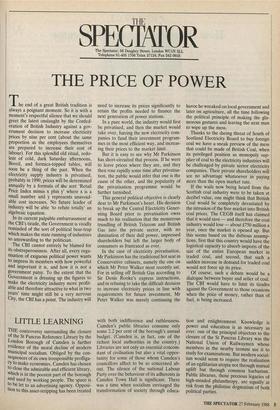SPECTATOR
The Spectator, 56 Doughty Street, London WC1N 2LL Telephone 01-405 1706 Telex 27124; Fax 242 0603
THE PRICE OF POWER
The end of a great British tradition is always a poignant moment. So it is with a moment's respectful silence that we should greet the latest onslaught by the Confed- eration of British Industry against a gov- ernment decision to increase electricity prices by nine per cent (about the same proportion as the employees themselves are prepared to increase their cost of labour). For this splendid old ritual, redo- lent of cold, dark Saturday afternoons, Bovril, and formica-topped tables, will soon. be a thing of the past. When the electricity supply industry is privatised, probably in 1990, prices will be determined annually by a formula of the sort 'Retail Price Index minus x plus y' where x is a small number and y represents unavoid- able cost increases. No future leader of industry will be able 'to refute totally' an algebraic equation.
In its current palpable embarrassment at the CBI's tirade, the Government is vividly reminded of the sort of political bear-trap which makes the state running of industries so unrewarding to the politician.
The CBI cannot entirely be blamed for its obstreperousness. After all, every orga- nisation of exiguous political power wants to impress its members with how powerful and important it is, and how it is not a government patsy. To the extent that the Government is dressing up the figures to make the electricity industry more profit- able and therefore attractive to what in two years' time might still be a very nervous City, the CBI has a point. The industry will need to increase its prices significantly to retain the profits needed to finance the next generation of power stations.
In a pure world, the industry would first be privatised, and then the market would take over, forcing the new electricity com- panies to fund their investment program- mes in the most efficient way, and increas- ing their prices to the market limit. But it is easy to see why Mr Parkinson has short-circuited that process. If he were to leave prices where they are, and they then rose rapidly some time after privatisa- tion, the public would infer that one is the cause of the other, and the popularity of the privatisation programme would be further tarnished.
This general political objective is clearly dear to Mr Parkinson's heart. His decision to break up the Central Electricity Gener- ating Board prior to privatisation owes much to his realisation that the monstrous trundling of British Telecom and British Gas into the private sector, with no diminution of their dull power, impressed shareholders but left the larger body of consumers as frustrated as ever.
In the case of electricity privatisation, Mr Parkinson has the traditional hot seat in Conservative cabinets, namely the one on which Mr Peter Walker most recently sat. For in selling off British Gas according to Sir Denis Rooke's express instructions, and in refusing to take the difficult decision to increase electricity prices in line with requirements for future investment, Mr Peter Walker was merely continuing the havoc he wreaked on local government and later on agriculture, all the time following the political principle of making the gla- morous gestures and leaving the next man to wipe up the mess.
Thanks to the daring threat of South of Scotland Electricity Board to buy foreign coal we have a sneak preview of the mess that could be made of British Coal, when its privileged position as monopoly sup- plier of coal to the electricity industries will be challenged by private sector electricity companies. Their private shareholders will see no advantage whatsoever in paying more than the open market rate.
If the wails now being heard from the Scottish coal industry were to be taken at decibel value, one might think that British Coal would be completely devastated by the intrusion of the free market into British coal prices. The CEGB itself has claimed that it would save — and therefore the coal industry would lose — about £750 million a year, once the market is opened up. But this seems based on the dubious assump- tions, first that this country would have the logistical capacity to absorb imports of the size of the entire European market in traded coal, and second, that such a sudden increase in demand for traded coal would not force up its price.
Of course, such a debate would be a dialogue between buyer and seller of coal. The CBI would have to limit its tirades against the Government to those occasions when the price of money, rather than of fuel, is being increased.


















































 Previous page
Previous page